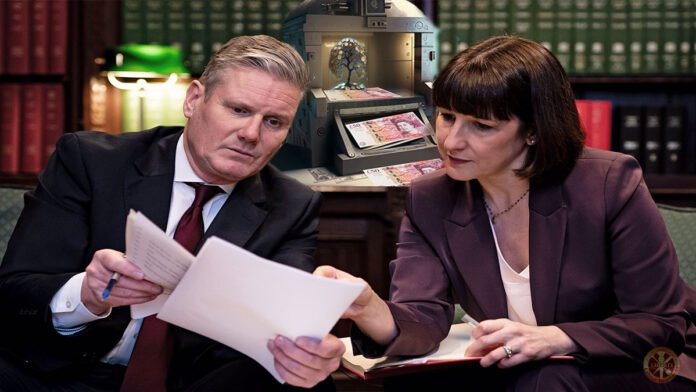The Truth About Money They Don’t Want You to Know
Labour Heartlands Editor’s Introduction
Ever wondered why politicians always claim there’s no money for hospitals, schools, or benefits, but somehow there’s always billions for bombs, bank bailouts, and corporate subsidies? Ever questioned why Rachel Reeves cries about having to attack disabled people while maintaining that the government’s “hands are tied” by financial markets?
You’re right to be suspicious. Because it’s all lies.
Professor Richard Murphy, one of Britain’s foremost experts on how money actually works, has spent years exposing the biggest con trick in modern politics: the myth that sovereign governments are somehow helpless victims of financial markets, forced to implement austerity because “there’s no alternative.”
There is an alternative. There’s always been an alternative. The reason politicians don’t take it has nothing to do with economics and everything to do with ideology.
Murphy’s analysis below destroys the foundation of every argument used to justify attacking working people while enriching the wealthy. He explains, in clear terms, why the UK government, as the creator of the pound, never needs to beg financial markets for permission to spend money helping its own citizens.

This isn’t just technical economic theory. This is the truth that could transform British politics if enough people understood it. Because once you realise that austerity is a choice, not a necessity, you start asking very different questions about the people making those choices.
Once again this week, we’re being told that the government’s hands are tied by the financial markets. Once again, politicians are hiding behind the convenient fiction that bond traders in the City dictate what a sovereign government can and cannot do. Once again, we’re expected to swallow the lie that there’s simply no alternative to attacking disabled people, pensioners, and the poor because “the markets demand it.”
Enough…
This pernicious myth has been used to justify every act of economic violence against working people for the past four decades. It’s the excuse politicians reach for when they want to implement policies they know are morally indefensible but ideologically essential to their worldview. It’s time to demolish this lie once and for all.
Read on, and prepare to be angry. Because everything they’ve told you about government finances has been a lie designed to make you accept the unacceptable.
The following article is by Richard Murphy, Economic justice campaigner and Emeritus Professor of Accounting Practice at the University of Sheffield.
Why UK Governments are Never Dependent on Financial Markets.

There’s a persistent myth that our government is somehow at the mercy of the financial markets and that it has to dance to their tune. This is most definitely doing the rounds this week, mainly as a result of Labour’s mismanagement of its own party, and Rachel Reeves’ subsequent very public tears.
It’s a myth I have been challenging for years, so let me summarise why.
1. The government creates the money
The UK government is the monopoly issuer of the pound. It spends all of that money into existence. Every pound of government spending creates a matching financial asset for someone else. It is only afterwards that the government issues bonds, not because it needs the money, but to provide a safe place for savers to deposit their funds when banks cannot provide this service.
This point is critical. The government does not need the markets to ‘fund’ its spending. It is simply swapping one form of money (reserves) for another (gilts). Bizarrely, it pays interest to those to whom it provides this service.
2. Gilts are a choice, not a necessity
The sale of government bonds, gilts in the UK, is presented as if the government is dependent on the markets to keep spending. This is nonsense. The government issues gilts largely because:
- It wants to drain reserves from the banking system to help the Bank of England hit its (currently too high) interest rate target.
- It wants to give pension funds and insurance companies a safe deposit facility to underpin their promises to those who use their services.
- It believes it must maintain an outdated and now unnecessary City-based financial architecture.
None of this means it needs the markets to spend. If no one bought gilts, the government could continue to spend. In fact, as quantitative easing and now quantitative tightening prove, there is no relationship between bond issues and Bank of England market interventions and the capacity of the government to spend: the evidence is all there for anyone to see.
3. The central bank is always the buyer of last resort
When financial markets are in turmoil, as happened in the mini-budget fiasco under Liz Truss, the Bank of England steps in. Its role is to stabilise prices and yields. This is not optional. It is a fundamental part of having a sovereign currency and a central bank that acts as the lender of last resort. This means the financial markets are, in fact, dependent on the government and its central bank. Not the other way around.
4. Interest rates are a policy choice
People say, “but the markets set interest rates, and so they can discipline the government.” Again, this misunderstands monetary operations. The Bank of England sets the base rate. It can cap or control longer-term rates by buying or selling bonds as it chooses. The so-called market rates are policy-contingent.When push comes to shove, the central bank can always enforce the interest rate it wants.
5. What markets really influence is ideology
So why the obsession with ‘market confidence’? The reality is, politicians and economists often invoke markets to justify austerity. It is easier to say “the markets demand it” than to admit their own ideological choice, which would otherwise be unpalatable to the electorate. Financial markets do, in that case, play a political role, but they do not hold the government hostage. They operate within the monetary framework that the government and its central bank set. We could just as easily choose to run the economy with other priorities, but it does not suit neoliberal politicians to do so. That is because they view politics as the City does, at cost to us all.
Summary
I keep returning to this issue because it is so fundamental: the UK government is a currency creator, not a currency user. It is not like a household. It does not need to beg or borrow from the markets to spend. Financial markets are accommodated by the government, not the other way around.
Understanding this changes everything. It means that economic policy decisions — on public services, investment, climate action, and inequality — are political choices, not technical constraints imposed by bond traders. That is why misinformation on this issue matters so much, and the fact that it is so widespread shows just how strong are the forces that wish to deny that democratic choices can still be made in the UK.

This article was first published by Richard Murphy on his blog, Funding the Future
Support Independent Journalism Today
Our unwavering dedication is to provide you with unbiased news, diverse perspectives, and insightful opinions. We're on a mission to ensure that those in positions of power are held accountable for their actions, but we can't do it alone. Labour Heartlands is primarily funded by me, Paul Knaggs, and by the generous contributions of readers like you. Your donations keep us going and help us uphold the principles of independent journalism. Join us in our quest for truth, transparency, and accountability – donate today and be a part of our mission!
Like everyone else, we're facing challenges, and we need your help to stay online and continue providing crucial journalism. Every contribution, no matter how small, goes a long way in helping us thrive. By becoming one of our donors, you become a vital part of our mission to uncover the truth and uphold the values of democracy.
While we maintain our independence from political affiliations, we stand united against corruption, injustice, and the erosion of free speech, truth, and democracy. We believe in the power of accurate information in a democracy, and we consider facts non-negotiable.
Your support, no matter the amount, can make a significant impact. Together, we can make a difference and continue our journey toward a more informed and just society.
Thank you for supporting Labour Heartlands









